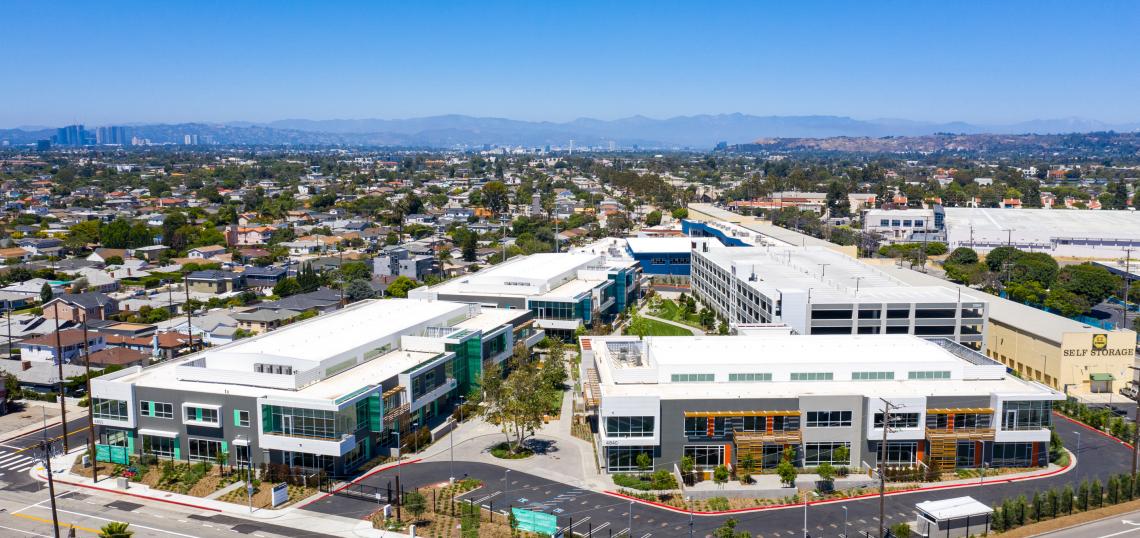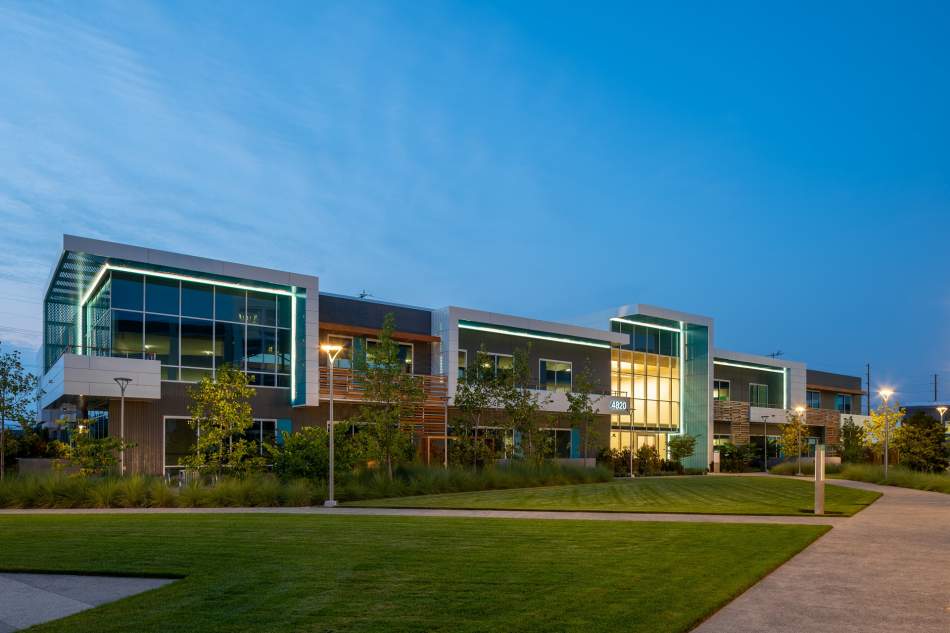A new office campus in the Del Rey community has scored an anchor tenant, co-developers Continental Development Corporation and Mar Ventures, Inc. announced earlier this week.
Video game company Electronic Arts will soon decamp from its longtime home in the Playa Vista neighborhood to the Del Rey Campus, located 4820 Alla Road. The Redwood City-based firm has signed a 10-year lease for a 58,034-square-foot buiding.
The approximately 5.7-acre campus, which opened earlier this year, includes multiple two-story structures consisting of more than 160,000 square feet of offices.
Electronic Arts is currently based out of the Water's Edge campus on Lincoln Boulevard.
Other headlines from the past week:
- Metro to run Sunday/Holiday service on Thanksgiving Day (The Source)
- In L.A., not every moral crusade over real estate is Darth Vader versus Luke Skywalker: A Boyle Heights-based non-profit wants to sell its longtime home to fund programming, but local preservationists are attempting to landmark the building, potentially jeopardizing the plan (LA Times)
- Delta Terminal Work Ahead of Schedule at LAX: "Call it an unexpected bonus from the coronavirus pandemic: Construction on the $1.9 billion renovation of Delta Air Lines’ Terminals 2 and 3 at Los Angeles International Airport is running 18 months ahead of schedule." (LA Business Journal)
- Homeless Families Who Occupied Vacant El Sereno Homes Will Now Move Into Them Legally: "In March, a group of unhoused and housing-insecure families drew national attention when they began occupying 13 vacant CalTrans-owned homes in El Sereno. Now, members of the "Reclaiming Our Homes" movement are moving into some of those properties legally, as part of an unprecedented partnership between the state transit agency and the city." (LAist)
- California Transportation Commission Releases Staff Recommendations for $2B in Transportation Funding: Including money for the I-105 ExpressLanes and Metros' NextGen bus program (Streetsblog CA)
- Will ‘Amtrak Joe’ Biden bail out California’s troubled bullet train? Don’t bet on it: "For months, some supporters of California’s troubled high-speed rail project have pined for a Biden presidency, hoping his administration would throw its support behind the planned system between Los Angeles and the Bay Area, with trains running at 220 mph....But while state officials anticipate more peaceful dealings with the new administration, nobody expects an imminent bailout. Some doubt that the president-elect will make investment in high-speed rail a priority." (LA Times)
- Sorry, Biden’s Still Great for Rail: Streetsblog SF claps back at the LA Times piece on Joe Biden and California High-Speed Rail (Streetsblog SF)
- L.A. Should ‘Al Fresco’ Its Bus Stops: "Case in point: L.A.’s 'Al Fresco program allows restaurants to expand dining areas into sidewalks, parking lanes, and driving lanes; however, no similar actions have been taken to expand bus stops, which are often cramped on what limited sidewalk space remains. While transit ridership has dropped everywhere across the country since March, the drop in bus ridership in L.A. has been less than every other large city, which tells us many Angelenos continue to rely on this vital service. Bus ridership is now more than half of what it was before the pandemic, and continuing to increase." (Streetbslog LA)
- Here's what 'stations' for Elon Musk's The Boring Company look like: "Transportation experts say that images of Musk's system that were released last week reflect failures to surmount basic issues that subways solved long ago. They caution that the design for his stations accommodating multiple vehicles appears to show significant drawbacks, such as inefficient use of space and what appears to be a level of inaccessibility for the disabled." (CNN)
- Where does LA need trees? Google to help city figure that out: "The tool uses infrared aerial imagery to show Los Angeles trees with local context, such as what percentage of a neighborhood has leafy coverage, an area’s population density, what areas are vulnerable to extreme heat and which neighborhood councils can help get new roots in the ground, according to Google." (Daily News)
- Southern California’s median home price rose sharply in October: "Economists and real estate agents say the housing market has been red hot because of the COVID-19 pandemic." (LA Times)
- Councilmember Krekorian Cancels Magnolia Boulevard Widening: "City will only proceed with project's safety and rainwater components" (Streetsblog LA)
- Black and Latino renters face eviction, exclusion amid police crackdowns in California: "A map of the programs’ expansion has left a distinct pattern: As Black people and Latinos moved to the suburbs in search of safer neighborhoods and cheaper housing, crime-free housing policies often came soon after." (LA Times)
- County Developing Plan to Add 138-miles of Multi-Use Paths on SGV Waterways: "Though the SGV Greenway Strategic Implementation Plan is still a few years out from being finalized, 13 projects have already started and are in various stages of development, including the Puente Creek Greenway and San Jose Creek Regional Access Multiuse Path." (Streetsblog LA)
- Garcetti’s signature homeless program shelters thousands, but most return to the streets: "The data provided by LAHSA showed that 31% of those leaving the shelters went back to the street and 35% to unknown destinations. Another 13% found other temporary housing, either with friends or family or in a program; 4% checked into a mental hospital, detox program or nursing facility; 2% went to jail, and seven—less than half a percent—died." (LA Times)
- In U.S. Cities, The Health Effects Of Past Housing Discrimination Are Plain To See: "Researchers from the National Community Reinvestment Coalition, the University of Richmond and the University of Wisconsin-Milwaukee analyzed historic redlining maps from 142 urban areas across the U.S. — these maps, created in the 1930s, classified Black and immigrant communities as risky places to make home loans. They compared the maps to the current economic status and health outcomes in those neighborhoods today and found higher rates of poverty, shorter life spans and higher rates of chronic diseases including asthma, diabetes, hypertension, obesity and kidney disease." (NPR)







